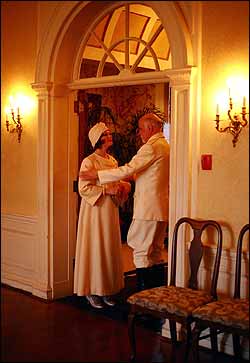 Hanging
with TheFrey
Hanging
with TheFrey Hanging
with TheFrey
Hanging
with TheFrey
Tamara
with
Ellen Dubin
Review by
Richard Ouzounian - Toronto Star
Apr. 8, 2003. 01:00 AM
Chasing the characters around Graydon Hall Manor during the performance of Tamara can be great fun, but a subtle play would be much more appropriate for such a unique setting.
Tamara is not just another play
Performance takes place in a mansionClever concept plagued by weak script
RICHARD OUZOUNIAN
THEATRE CRITIC
Tamara
By John Krizanc. Directed by Richard Rose. Until April 13 at Graydon Hall Manor, 185 Graydon Hall Dr. 416-973-4000.
The secret is to keep moving.
If you decide to see Tamara, which opened Sunday night at Graydon Hall Manor, you might be well advised (for the first act, anyway) to do as I did and follow Ellen Dubin, who plays Emilia Pavese, the kleptomanical housemaid of easy morals.
Boy, does she move!
I spent most of the show's first hour running up and down stairs, dashing in and out of rooms, pushing past people and grasping for bits of information.
That was the fun part.
But in Act II when I actually had to heed the plot, characters and dialogue, it got a lot less interesting.
John Krizanc's play is a melodramatic concoction set in the Italy of 1927 when Mussolini's fascists were solidifying their hold on the country.
It focuses on poet Gabriele D'Annunzio and the kaleidoscope of political and sexual intrigue that swirls around him.
But you don't go to Tamara for the story. You go for how it's told. This living movie is set not in a theatre, but all over a spacious mansion, and although every room is alive with activity for most of the evening, you have to choose which of 10 characters you're going to follow.
Consequently, there is no such thing as "a right way" to see the show. Everyone is going to miss something, and that's just how it goes. So should you see it?
Well, the strength of Tamara is in its clever concept and bravura execution, courtesy of director Richard Rose, rather than in its incredibly feeble script.
Krizanc writes here in three styles, none of them all that admirable:
The epigrammatic: "Perhaps the house has gotten bigger. Perhaps we've gotten smaller." Everybody starts to sound like they're on a Fascist version of Gilmore Girls.
The self-analytical: "Rome! Venice! I don't care about you men and your cities." Characters keep taking their own temperatures as though they were in an unstaffed walk-in clinic.
The narrative: Lines such as, "As long as Finzi thinks Dante doesn't know about Mario and me," are just as hard to follow as they seem to be and there's an awful lot of them.
No matter how kinetic the staging is, a text like this eventually slows to a leaden crawl.
The actors that I spent the most time with varied widely in quality. Ellin Dubin as the housemaid was solidly and subtly in character throughout, while Victor Ertmanis huffed and growled to fine effect as a sinister fascist.
On the other hand, Roger McKeen grew dull rather quickly as the faithful Dante and Dan Lett lacked the charm and sexual magnetism necessary to play the chauffeur Mario.
I grew to wonder if the whole project suffered from a serious internal flaw. When actors are going to be playing vital scenes less than a foot away from you, it might be a better idea if they were telling a subtle and delicate story, rather than a loud and boisterous one.
As for the pros and cons of the experience, I've visited far less impressive houses, but I've seen far more impressive plays.
Article by Richard Ouzounian
Tamara http://www.torontostar.com